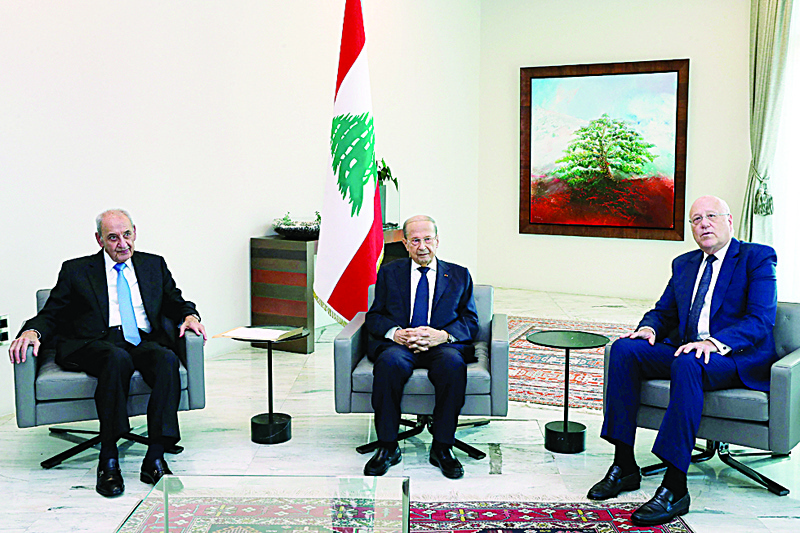 BAABDA: A handout picture provided by the Lebanese photo agency Dalati and Nohra shows Lebanon's Parliament Speaker Nabih Berri (L) and President Michel Aoun (C) meeting with two-time premier Najib Mikati at the presidential palace in Baabda, east of the capital Beirut yesterday. - AFP
BAABDA: A handout picture provided by the Lebanese photo agency Dalati and Nohra shows Lebanon's Parliament Speaker Nabih Berri (L) and President Michel Aoun (C) meeting with two-time premier Najib Mikati at the presidential palace in Baabda, east of the capital Beirut yesterday. - AFP
BEIRUT: Lebanese lawmakers yesterday tasked ex-premier and billionaire Najib Mikati with forming a government and ending one year of political deadlock that has crippled the economy. Mikati, seen by many as a symbol of Lebanon's corrupt oligarchy, will pick up where Saad Hariri left off earlier this month, after failing to broker a deal despite intense international pressure.
A new government would face the daunting task of steering Lebanon through one of the worst phases in its history, and to polls slated for next year amid unprecedented popular distrust. Mikati, a 65-year-old telecom mogul who was last in power in 2014, is the third PM-designate to be named since the caretaker government of Hassan Diab resigned in the wake of last August's monster port blast.
He clinched more than 72 endorsements, with only one lawmaker voting in favour of veteran diplomat Nawaf Salam, according to the official National News Agency. A total of 42 lawmakers, including members of the president's Free Patriotic Movement, abstained from endorsing any candidate, NNA said. Top parliamentary blocs, including Hariri's Future Movement and the powerful Shiite movement Hezbollah, named Mikati as their pick.
Mikati will now have to start consultations with the president and political factions to set a cabinet lineup, while Diab stays on in a caretaker capacity. It could take months before an actual government is formed, but crisis-hit Lebanon, grappling with soaring poverty, a plummeting currency and shortages of basic items from medicine to fuel, can ill afford any delays.
'Magic wand'
Speaking to reporters after a meeting with Aoun, Mikati called his designation a "difficult step", appealing for the Lebanese people to support him. "If I didn't have the necessary guarantees from external powers... I would not have taken on" the job, he said, referring to foreign backing. "I don't have a magic wand and, alone, I can't make miracles happen," he said.
"Whomever has solutions should bring them to the table." Mikati, who started a career in politics in 1998, is considered to be Lebanon's richest man and one of the wealthiest in the Middle East, with a net worth of $2.7 billion according to Forbes. Many in Lebanon consider the businessman as emblematic of a corrupt ruling class targeted by a 2019 protest movement. A native of second city Tripoli, he is suspected of illicit enrichment in 2019, and lacks a wide popular base even in his hometown, which is Lebanon's poorest.
On the eve of consultations, dozens of protesters gathered outside Mikati's Beirut home, accusing him of corruption and cronyism. But Lebanon's bickering politicians view Mikati as a consensus candidate who could be capable of easing a political impasse that has stymied efforts towards forming a government. Following Mikati's designation, the Lebanese pound, officially pegged to the dollar at 1,507, gained some of its black market value after dropping to record lows in mid-July. It sold for less than 17,000 to the greenback yesterday, up from more than 20,000 last week.
International aid
Donors led by former colonial power France have pledged millions of dollars in humanitarian aid, but conditioned it on Lebanon installing a government capable of tackling corruption. But even as international pressure mounted, with threats of European Union sanctions against them, Lebanese politicians have failed to make any serious progress.
France this month said it would host an aid conference on August 4 to "respond to the needs of the Lebanese, whose situation is deteriorating every day". The date of the conference coincides with the first anniversary of the port blast that killed more than 200 people, and which is widely blamed on decades of negligence by the country's ruling class.
Mikati first rose to the post of prime minister in 2005, when he headed a three-month interim government formed in the wake of the 2005 murder of former premier Rafic Hariri. In 2011, he came back at the helm of a government dominated by the powerful Shiite Hezbollah movement, and which had to deal with the spillover effects of the Syrian war next door. In 2013, he resigned amid deep polarisation between the country's political camps over the conflict in Syria, and as infighting in his own government led to a paralysing political impasse. He stayed on in caretaker capacity until 2014. - AFP




